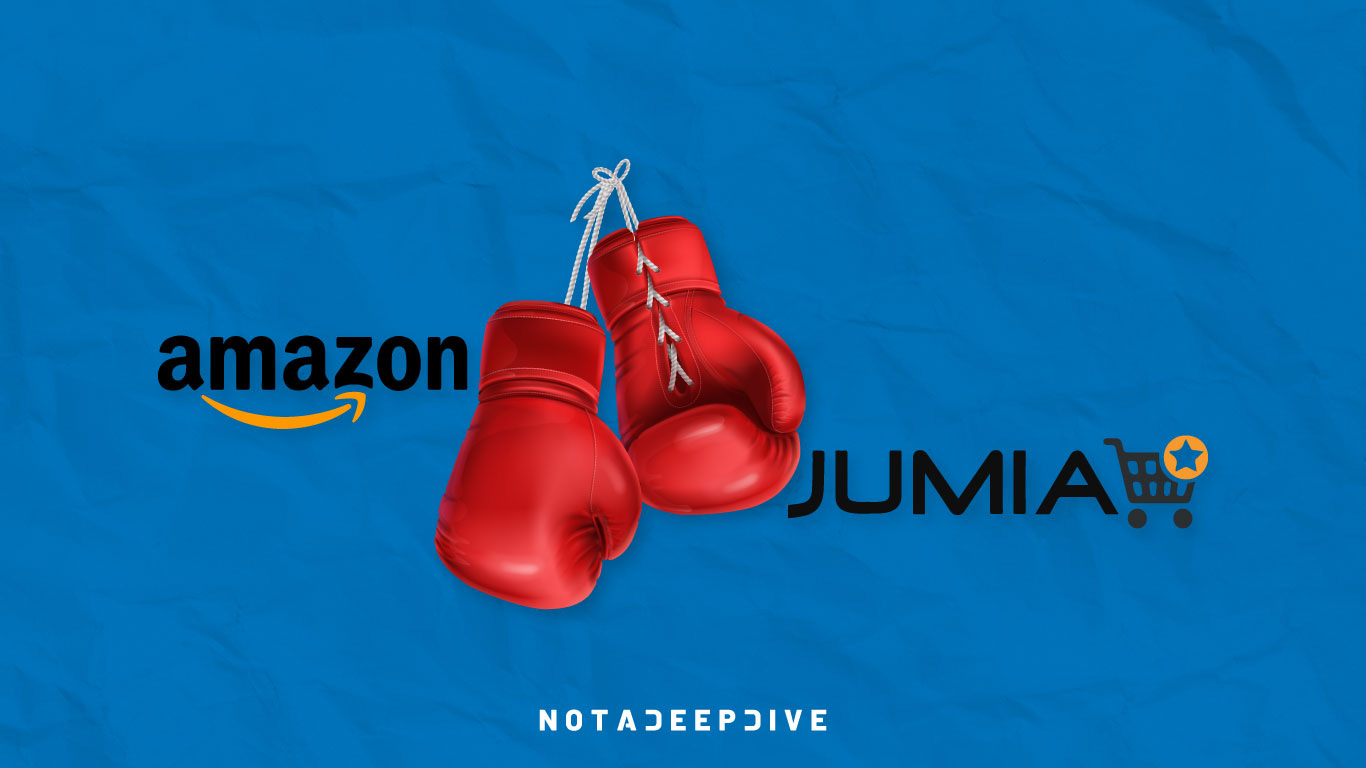Will the real Amazon please stand up?
Amazon vs "Amazon Of Africa"
If you missed last week’s newsletter, catch up here.
Today’s Notadeepdive is 5-minutes long. Share today’s newsletter:
This newsletter is brought to you by Fincra and SweepSouth. Fincra provides reliable payment solutions for fintechs, online platforms and global businesses. SweepSouth Nigeria keeps your house super clean while you put your feet up, and at prices that don’t hurt your wallet!
TOGETHER WITH FINCRA
Payment collection just got easier on Fincra! Receive payments from your customers via debit/credit cards or bank transfers and settle these payments to your Fincra wallet or your bank account.). As a business, you only need to create easy-to-share payment links from the Fincra merchant portal or embed payment buttons on your online platform to gain access to Fincra Checkout; no coding is required.
In the world of business and technology, this week’s script was written in blood red. Cryptocurrency, which has been touted as a hedge against inflation, took a beating all week, with Bitcoin trading at $20k, its lowest price this year. The U.S stock market is also seeing red. People are selling off stocks over worries that the Fed may raise rates again– I talked about why Central Banks raise rates here.
In Nigeria, the outlook is similar. The Nigerian Stock Exchange, which has been bullish for some parts of the year, closed on a low note yesterday. Per The Guardian, the NGX lost N197 billion in total market capitalisation to close at N28.255 trillion. Hang in there, it gets worse; this week, data from the bureau of statistics showed that inflation hit 17.71% in May 2022. Food inflation also rose to 19.50%.
Inflation to the Nigerian economy
Nigeria’s inflation has been stuck in the double digits for the last two years, but global pressures are worsening it. Russia’s war in Ukraine is affecting the prices of everything from oil to wheat. The most on the nose analysis is that Nigeria is not immune to global patterns.
What other global patterns have we seen lately? Give me my Nyesom Wike moment here by answering, “layoffs.” On Thursday, Coinbase fired 18% of its staff, and like I said five newsletters ago, these are the times to keep your friends close and your employer closer. What’s the point of talking about global layoffs and whether Nigerian startups could also start trimming headcount?
For one, it could help employees know what’s coming. A trend in many of these layoffs is that employees remain in the dark until the axe falls as we saw with the checkout startup, Fast. This week, multiple sources told me that some startups in Nigeria are beginning to have serious conversations with staff.
One source at a crypto startup shared that senior management talked to them about the imperative of shipping products that generate revenue. Another source at a fintech startup said the revenue targets at his company have been revised by as much as 10X. Both sources declined to have themselves or their companies named for fears of retaliation. It’s definitely belt-tightening season.
Another source told me that silent layoffs and salary cuts have happened at two different startups, with some disengaged workers asked to sign non-disclosure agreements. I have not been able to independently verify this claim, but the broader feeling is that tough times might be here sooner than expected. As with the pandemic, startups will have to consider their cash runway and business models before making tough decisions. In the interim, we’ll only continue to watch.
TOGETHER WITH SWEEPSOUTH
You don't need to cut corners to get a well-rounded experience.
We all have those corners in our homes that are hard to reach or too stressful to clean...you just thought about that particular spot in your, house didn't you 😏
The good news is, those hard corners don't have to be your problem anymore.
Book a vetted, reliable and excellent SweepStar from SweepSouth to handle your home cleaning so you never have to worry about those tough-to-reach corners.
Book today for prices starting as low as N3,400 per booking.
Amazon will take on the Amazon of Africa
Jumia, one of the leading e-commerce players in Africa was once dubbed the “Amazon of Africa.” At the time, the excitement over Jumia and the e-commerce space was at its peak, and its unicorn status pushed optimism. But the nature of markets is that things change quickly; today, Jumia and e-commerce have since lost their sexiness.
Mounting losses have led to questions about its business model, its path to profitability and if Africa has the addressable market to make e-commerce profitable. Jumia has persisted through these troubles, insisting that it will reach profitability soon. In the last two quarters, it has seen better fortunes, raising its Gross Merchandise Value and its number of active users. It has led to positive sentiments for the business once again.
Yet, the single biggest factor that will propel excitement for e-commerce is this report that Amazon will launch its online marketplace in 5 new countries by Q1 2023. Nigeria and South Africa are the two African countries on that list. Yes, you read that right, Amazon will now compete with Jumia in one of the biggest markets in Africa.
If your first instinct is to say “RIP Jumia” or “Amazon will crush Jumia,” then you’re not thinking of it widely enough. What Amazon’s entry will do is cement Jumia’s decade-long conviction that e-commerce can thrive in Africa, especially as it continues to inch towards profitability. Jumia will also take encouragement from the fact that it knows the African market pretty well. It has learned through some stumbles—it once had a presence in 14 African countries but has since trimmed that down to focus on its biggest markets.
Yet, the most important piece of the puzzle is from a conversion I had with Abubakar. For him, e-commerce in Africa, like in most countries, will be a multi-winner market, just like the telecoms industry. It’s hard to get the sense that this is anything but a positive for Jumia, but these are still early days; the biggest thing to look out for is Amazon’s execution. We watch!
What I’ve been reading
Fintech Giant Klarna Slashes Fundraising Ambition [Paywall]
Inside a culture war stoked by a Crypto CEO
Washington Post fires reporter following critical tweets
Africa’s Governments Face Stark Choices as Fuel Prices Scale New Highs
Edited by: Jimi Osheidu and Alexander Onukwue
See you on Sunday!








What does Amazon launching in Nigeria really mean for the Nigerian Consumer though?, as it is most Nigerian who bother to purchase things online have bought once or twice from amazon even though the delivery/logistics of what we buy can be a nightmare. What exactly changes for the Nigerian who purchased something before on Amazon